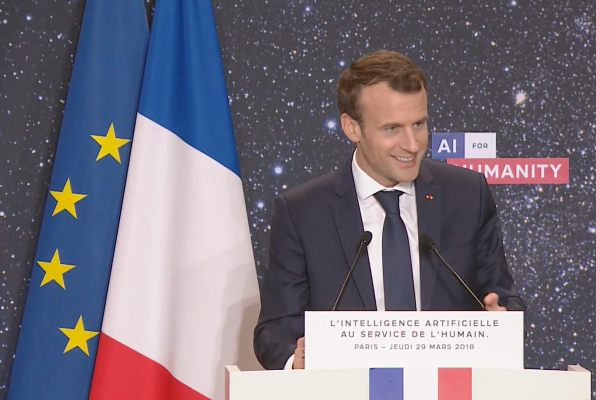Emmanuel Macron and his government are launching a big initiative around artificial intelligence today. They want to turn France into one of the leading countries when it comes to artificial intelligence.
“[Artificial intelligence] is a technological, economical, social and obviously ethical revolution,” Macron said in a speech. “This revolution won’t happen in 50 or 60 years, it’s happening right now. There are new opportunities and we can choose to follow some innovations or not.”
Some of the best mathematics and engineering schools are in France, and some of the best data scientists and AI researchers come from France. Many of them now work in California or London for Facebook, Deepmind, etc. And the French government wants to capitalize on that soft power to make an AI push.
And yet, how do you attract engineers and scientists? France’s answer is quite complicated because the government doesn’t want to inject a ton of public money and call it a day. It’s all about creating an AI ecosystem with strong pillars.
France’s AI strategy
First, many private companies have opened or plan to open AI research centers in France. Facebook and Google already work with hundreds of researchers in Paris. Today, Samsung, Fujitsu, DeepMind, IBM and Microsoft all announced plans to open offices in France to focus on AI research.
This represents tens of millions of dollars in investments and hundreds of employees. “Everybody is saying that Silicon Valley is overflowing right now,” a source close to the French President told me. That’s why big tech companies need to find talent outside of the U.S.
Foreign companies creating hundreds of jobs isn’t going to foster public research and European tech giants though — these companies are just tapping the smartest brains they can find. That’s why the French government wants to make it easier to work on fundamental research papers when you work for a private company.
The INRIA is going to create a national AI research program with four or five partners. The goal is quite simple — Macron said that there should be twice as many people studying and researching AI projects in France. Researchers will also be able to access and use some cloud computing capacities for their work.
It’s also going to get easier if you want to create a startup based on your research work or if you want to work for a private company during your PhD.
Second, France is going to set some new boundaries when it comes to data. French administrations are going to share new data sets so that anyone can build AI services using those data sets.
When it comes to health data, it looks like France wants to avoid another NHS/DeepMind scandal. While multiple French governments have worked on some kind of health data hub, Macron announced that this time it’s going to happen for real. The INDS is going to make sure that services and public institutions respect your privacy and grant authorizations on a case-by-case basis.
Third, when it comes to regulation, companies will be able to experiment in multiple industries. And it starts with autonomous vehicles. Companies will be able to test level 4 self-driving cars in 2019.
Overall, France is going to invest $1.85 billion (€1.5 billion) in AI projects, from public research to startup investments. Last year, Macron announced that there would be a new $11.2 billion (€10 billion) public fund managed by Bpifrance. Macron said today that AI startups should be the first priority of this new fund.
Making AI as neutral as possible
Arguably, the most interesting part of Macron’s speech was about the moral impact of artificial intelligence. As algorithms become more prominent, there’s a risk that they become black boxes that decide for you.
The French administration already has to share all its algorithms and data that they use following Axelle Lemaire’s law. But that’s still not the case for some touchy subjects. Macron said it’s still a work in progress.
Research projects or companies financed with public money will also have to share everything — this could impact public infrastructure companies for instance.
But it’s more complicated when you’re talking about private companies. Macron said GDPR was a step in the right direction. And now, he wants to go further.
He doesn’t have any practical suggestion for now, but he said that there should be an international certification authority. For instance, this authority could make sure that there’s no bias in training data sets. I don’t think Facebook or Google would enjoy this new regulation.
Finally, you introduce a bias if your staff is not diverse enough. That’s why schools and universities should make sure that they train a diverse group of people.
Not the first AI push
As Next INpact pointed out, there have been multiple reports on artificial intelligence over the past few years — FranceIA, the CNIL, the OPECST and the European Economic and Social Committee all wrote their own recommendations when it comes to AI policies.
Today, Fields medal winner and parliament member Cédric Villani shared a new report on artificial intelligence. It’s always an interesting read, and it was the inspiration for Macron’s speech today.
According to a source close to the French President, multiple ministers now have to focus on artificial intelligence for their own industries.
Today’s report feels more like a starting point than a conclusion. The French President thinks that AI is something important but not urgent. Now, it’s all about convincing the rest of the government to put aside all the urgent tasks for a minute and look at what’s important.
